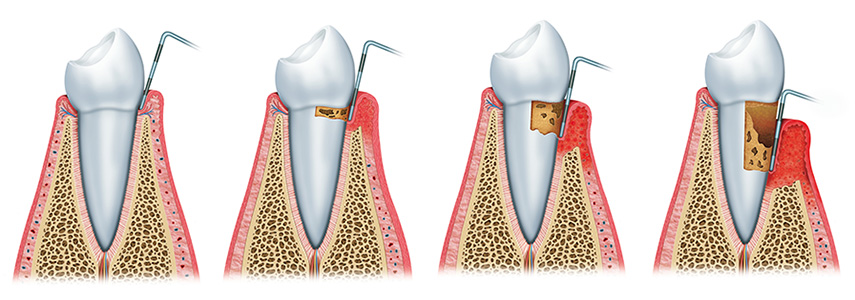One of the most common problems when it comes to dental health is that related to teeth that move. A rather widespread embarrassment that can create various problems in everyday life. What are the reasons and possible remedies for dental mobility? Is there a way to prevent the discomfort caused by moving teeth?
Miller scale and degrees of tooth mobility

If you’ve been feeling a tooth swing for a few days, or maybe a week, the first thing you absolutely shouldn’t do is postpone the problem because you’d rather not think about it. In fact, it is essential to try to act immediately without waiting any longer, by making an appointment with your trusted dentist. You know, laughter is good for health. Even a smile, however, can become a luxury and if your teeth move, you know what we’re talking about. Dental mobility, in fact, embarrasses, creates anxiety and takes away the smile. A loose tooth is never a good sign, but first of all it must be clarified that this is not necessarily a diseased tooth or a lost tooth. A loose tooth is never a good sign, but first of all it must be clarified that this is not necessarily a diseased tooth or a lost tooth. To begin with, you can measure the level of mobility of your tooth by referring to the classes of the Miller scale, a table that classifies the severity of the problem according to the degree of oscillation of the tooth. A mobility degree of 1 means that under stimulation your tooth can move back and forth between 0.2 and 1 mm, so this is physiological mobility. A second-level mobility implies, on the contrary, an oscillation of up to 2 mm and in this case the tooth is said to be mobile. On the other hand, the case of third-level mobility, the most serious one, is different. In that case, in fact, the tooth has a displacement of more than 2 mm and also oscillates vertically as well as horizontally. If you think yours is a first-rate mobility case, you can breathe a sigh of relief, there’s not much to worry about. However, important precautions are needed such as excellent daily oral hygiene and thorough cleaning of the teeth by your dentist at least twice a year. If, on the other hand, your teeth oscillate beyond 1 mm, falling into level 2 or even level 3 of dental mobility, the situation is much more serious. You seriously risk losing the tooth in question and being left without it.
Teeth that move: the reasons
The teeth that move have as a cause some very specific reasons that can be the most disparate. The most common causes can generally be counted on the fingers of one hand. It could in fact be more or less serious cases of dental occlusion, related to the way in which the upper dental arch rests on the lower one, or, in most cases, of periodontitis.
- Dental occlusion. One of the most frequent symptoms of malocclusion is bruxism. The latter consists of nocturnal grinding of the teeth. Usually due to stress or malocclusion, bruxism subjects both dental arches to constant chewing efforts which over time can lead a tooth to move. In this case it is necessary to intervene not so much on dental mobility as on the nervous origins of grinding. In other cases, however, the teeth that move have causes that must be sought in the so-called orthodontic therapies. These are therapies which, using specific appliances, subject the teeth to continuous stresses which determine a functional movement of the teeth.
- Periodontitis. Bacterial infection that affects the gums and is generally caused by insufficient oral hygiene, mainly responsible for the formation of tartar. If left untreated, periodontitis leads to bone thinning and gum recession. The tooth will thus be much more unstable, it will begin to move and if not treated it will be destined to fall out. It is estimated that 40% of the population suffers from this disease in a more or less serious form with a high incidence after the age of thirty-five.
What to do with moving teeth

When the cause of loose teeth is periodontitis, you need to know that there is a solution. Periodontitis can be treated, but much depends on the timing of the intervention. If taken within the first months of the onset, it requires less demanding and invasive treatments than one in an advanced stage. This is why it is important to act promptly, booking a visit to your trusted dentist. He will be the one who, with his decennial experience and his empathetic skills, will guide you towards the best possible solution. Thanks to new technologies, in fact, periodontitis treated in the initial stage can be treated with laser therapy that minimizes invasive interventions in your oral cavity. It will therefore be enough to be patient and after the necessary sessions the infection will have practically disappeared. If, on the other hand, periodontal pockets have formed in the meantime, i.e. real detachments of the margin of the gum with a depth of more than 5 mm, it will be necessary to proceed with periodontal surgery. If, on the contrary, the problem is neglected, however, your tooth will be seriously compromised because it will be less and less firm and it will be enough to bite a fruit or bite into a sandwich for it to come off or break. In this case there will be nothing left to do: the tooth will have to be removed and a prosthesis will have to be installed. In our Sanident dental center in via Settembrini, 6, in Milan, we offer the possibility of preventing and/or treating this problem and also providing a solution to the different degrees of severity of periodontitis.
















